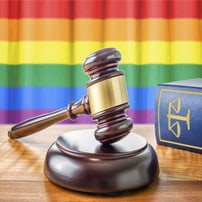 In June 2017, the United States Department of Commerce made headlines by removing language barring discrimination based on sexual orientation and gender identity from its annual equal opportunity statement. This led to a significant backlash from the public, which in turn lead the Commerce Department to restore the protections the very next day.
In June 2017, the United States Department of Commerce made headlines by removing language barring discrimination based on sexual orientation and gender identity from its annual equal opportunity statement. This led to a significant backlash from the public, which in turn lead the Commerce Department to restore the protections the very next day.
LGBT Employment Discrimination at the State Level
Although sexual orientation and gender identity are not explicitly listed as protected classes in Title VII of the Civil Rights Act, there have been cases where workers alleging this type of discrimination have been deemed to have suffered from sex-based discrimination. However, not having these protections in place at the federal level can create a precarious situation for workers in states that do not include sexual orientation and gender identity as protected classes.
Currently, 20 states list gender identity and sexual orientation as protected classes in their workplace discrimination laws. Others name only sexual orientation as a protected class or state that these are only protected classes for those employed by the state government. New Jersey’s Law Against Discrimination (NJLAD) names both classes as protected from discrimination in all types of employment. In Pennsylvania, they are only protected classes for state workers.
Changing Culture Drives Government Actions
In the past few decades, American culture regarding LGBT representation and rights has changed dramatically. Less than 10 years ago, LGBT members of the military could not openly discuss their gender identities and sexual orientations. After years of marriage equality being passed state by state, same sex marriage finally became legal in all states in 2015. Despite this, a substantial minority of Americans still oppose marriage equality. A 2017 Pew Research poll found that approximately 62 percent of Americans are in favor of same-sex marriage.
Like other social movements, LGBT equality is spurred by activists and other citizens willing to speak up about injustice and take action by protesting, writing to their representatives, and getting involved in government to make changes. It is important that workers never underestimate their power to stop workplace discrimination. When the Equal Employment Opportunity Commission investigates a case of alleged discrimination, it often asks the victim’s colleagues to provide testimonies about the behavior that occurred. It is illegal for an employer to retaliate against an employee for cooperating with this type of investigation, which ultimately aids all members of a work environment, not just the victim.
Philadelphia LGBT Discrimination Lawyers at The Gold Law Firm P.C. Help Discrimination Victims Seek Compensation
Philadelphia LGBT discrimination lawyers at The Gold Law Firm P.C. can help you pursue the compensation you deserve for damages you suffered because of discrimination in the workplace. Complete our online contact form or call us at 215-569-1999 to schedule a free review of your case in our Philadelphia office. We work with clients from Pennsylvania and New Jersey.



































